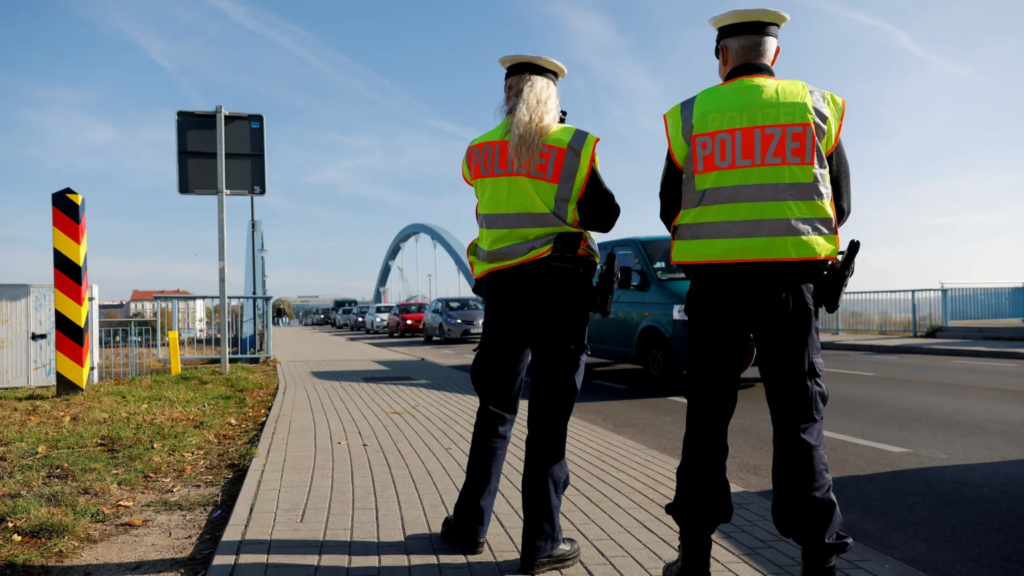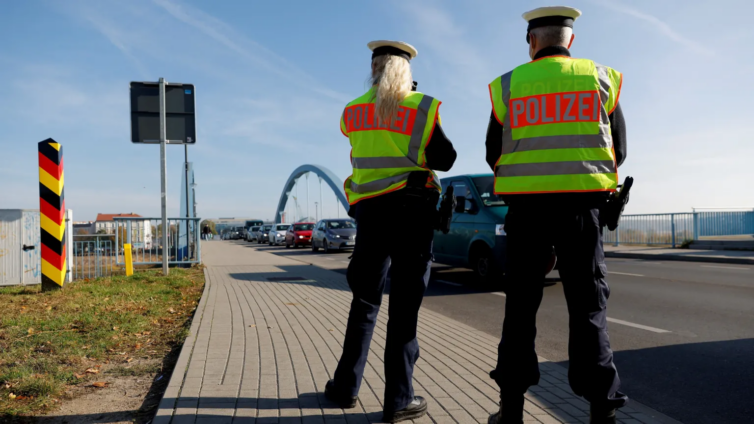Germany is set to expand border checks following a knife attack which left three people dead in the town of Solingen in August.
The government has come under pressure to take a harder line on immigration since the stabbing, in which the suspect is a Syrian national who was facing deportation after a failed asylum bid.
The attack has been claimed by the Islamic State group.
The new controls - which will be introduced on 16 September and initially last six months - were announced days after the anti-immigration Alternative for Germany (AfD) made big gains in local elections.
German Interior Minster Nancy Faeser insisted the government was "taking a hard line" against irregular migration, and said the checks would reduce Islamist extremism and cross-border crime.
"We are doing everything in our power to protect the people of our country against these threats," she added.
Germany already has controls at its eastern and southern borders with Poland, the Czech Republic, Switzerland and Austria, primarily spot checks on roads and in trains. Similar measures will be introduced at all border points.
However, critics said the move is more about politics than security.
Germany's mainstream parties were thrown into turmoil by the AfD's performance in regional elections in the east, which saw a far-right party top a poll for the first time since the Nazi era.

The governing SPD and other mainstream parties appear to have viewed the results as a message from voters to take a tougher stance on immigration and borders.
Successive governments in Berlin have allowed relatively large numbers of asylum seekers to settle in the country in recent years.
Germany took in more than one million people mostly fleeing war in countries such as Syria during the 2015-2016 migrant crisis, and has received 1.2 million Ukrainians since Russia's full-scale invasion began in February 2022.
However, with polls indicating the AfD could perform strongly in a regional election in Brandenburg at the weekend, parties on both the centre-left and centre-right are coming up with proposals that would have been unthinkable until recently.
The CDU - the party of former Chancellor Angela Merkel - has proposed turning all asylum seekers back at the border, even those who are eligible, on the basis they have travelled through other safe EU countries.
Gerhard Karner, Austria's interior minister, told Bild newspaper on Monday that his country would not take in any migrants rejected by Germany.
"There's no room for manoeuvre there," he said.
Since the Solingen stabbing, Chancellor Olaf Scholz's government has announced a raft of measures on migration.
They include changing the rules so asylum seekers facing deportation will lose benefits, and resuming the deportation of convicted Afghan criminals to their home country for the first time since the Taliban returned to power in 2021.
Latest Stories
-
I want to focus more on my education – Chidimma Adetshina quits pageantry
1 hour -
Priest replaced after Sabrina Carpenter shoots music video in his church
1 hour -
Duct-taped banana artwork sells for $6.2m in NYC
1 hour -
Arrest warrants issued for Netanyahu, Gallant and Hamas commander over alleged war crimes
2 hours -
Actors Jonathan Majors and Meagan Good are engaged
2 hours -
Expired rice saga: A ‘best before date’ can be extended – Food and Agriculture Engineer
2 hours -
Why I rejected Range Rover gift from a man – Tiwa Savage
2 hours -
KNUST Engineering College honours Telecel Ghana CEO at Alumni Excellence Awards
2 hours -
Postecoglou backs Bentancur appeal after ‘mistake’
2 hours -
#Manifesto debate: NDC to enact and pass National Climate Law – Prof Klutse
3 hours -
‘Everything a manager could wish for’ – Guardiola signs new deal
3 hours -
TEWU suspends strike after NLC directive, urges swift resolution of grievances
3 hours -
Netflix debuts Grain Media’s explosive film
3 hours -
‘Expired’ rice scandal: FDA is complicit; top officials must be fired – Ablakwa
4 hours -
#TheManifestoDebate: We’ll provide potable water, expand water distribution network – NDC
4 hours

